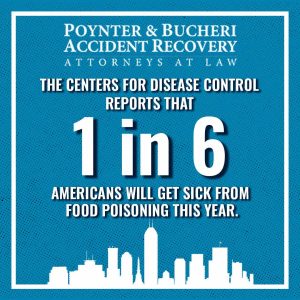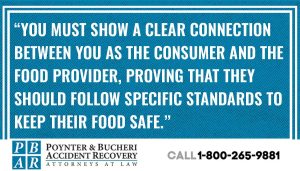
Can You Sue For Food Poisoning? What To Know

In this article, you’ll learn:
- What food poisoning is.
- The most common causes of food poisoning cases.
- Signs, symptoms, and lasting impact of food poisoning.
- Who may owe you compensation for your illness.
- When you need an attorney.
- What type of compensation may be available for your illness.
Food poisoning’s most typical symptoms begin with an upset stomach, often mistaken for a bad case of stomach flu, but can progress to a life-threatening illness.
Food poisoning, also known as foodborne illness, can be a life-threatening health event. This blog post will delve into the signs, symptoms, and potential lasting impact of severe food poisoning, shedding light on the importance of understanding and addressing this often-overlooked health concern.
What Is Food Poisoning?

The Centers for Disease Control reports that 1 in 6 Americans will get sick from food poisoning this year, despite comprehensive food safety laws and strict liability laws that hold food handlers and manufacturers responsible for damages.
Several foods are commonly associated with causing food poisoning due to contamination with harmful bacteria, viruses, or parasites. It’s important to note that improper food handling, failing to cook food to temperatures set by health codes, and faulty storage of leftover food increase the risk of foodborne illnesses.
Here are a few of the most commonly implicated foods in foodborne illness cases:
Raw or Undercooked Meat: Undercooked poultry or raw meat, including poultry, beef, pork, and lamb, can harbor harmful bacteria such as Salmonella, Escherichia coli (E. coli), and Campylobacter.
Raw or Undercooked Eggs: Raw or undercooked eggs and foods containing raw eggs (e.g., raw cookie dough) may carry Salmonella and cause Salmonella poisoning.
Raw Seafood: Raw or undercooked seafood, particularly shellfish like raw oysters, clams, and mussels, can be contaminated with Vibrio bacteria or norovirus.
Unpasteurized Dairy Products: Unpasteurized milk, cheese, and other dairy products may contain harmful bacteria like Listeria, E. coli, or Salmonella.
Pre-cut Fruits and Vegetables: Pre-cut or pre-packaged fruits and vegetables may pose a risk if they are not stored or handled correctly, leading to contamination with bacteria like Salmonella or Listeria.
Sprouts: Sprouts, including alfalfa, clover, and radish sprouts, are prone to bacterial contamination, especially with Salmonella and E. coli food poisoning.
Processed Meats: Processed meats such as deli, hot dogs, and sausages can be contaminated during processing and may carry Listeria or other harmful bacteria.
Unwashed Produce: Fresh fruits and vegetables not thoroughly washed before consumption can harbor bacteria, parasites, or pesticides.
Soft Cheeses: Soft cheeses made from unpasteurized milk, like Brie, Camembert, and feta, may be a source of Listeria contamination.
Cross-Contaminated Foods: Eating food cross-contaminated during preparation, where bacteria from raw fruits or meats are transferred to other foods, can pose a risk if not cooked thoroughly.
Contaminated Water: Untreated water can cause food poisoning when it is contaminated with harmful microorganisms such as bacteria, parasites, or viruses.
What Are The Most Common Signs of Food Poisoning?
Signs vary widely depending on the type of adulterated food, the amount of toxin exposure, and whether the victims have weakened immune systems. Having other illnesses at the same time can also exacerbate a case of food poisoning.
The most common symptoms of food poisoning are:
Gastrointestinal Distress: Gastrointestinal discomfort is one of the earliest signs of food poisoning. This includes symptoms like nausea, vomiting, abdominal pain, and diarrhea. These symptoms may appear within hours of consuming contaminated food.
Fever and Fatigue: Food poisoning can trigger an immune response in the body, leading to fever and fatigue. Feeling unusually tired and experiencing an elevated body temperature are common indicators that something might be amiss.
Muscle Aches: Some food poisoning cases can cause muscle aches and pains. This is often a result of the body’s inflammatory response to illness-causing bacteria or toxins in the tainted food.
Dehydration: Persistent diarrhea and vomiting can lead to dehydration, a severe complication of food poisoning. Staying hydrated by drinking fluids containing electrolytes to replenish what is lost is crucial.
Neurological Symptoms: In severe food poisoning cases, certain types of food poisoning can lead to neurological symptoms, including confusion, dizziness, and even seizures. These symptoms require immediate medical attention.
Duration and Severity: The duration and severity of food poisoning symptoms can vary depending on the type of contaminant involved. While some cases may resolve within a few days, others can lead to more prolonged discomfort and complications.
Post-Infectious Irritable Bowel Syndrome (PI-IBS): A lingering effect of food poisoning is the development of post-infectious irritable bowel syndrome (PI-IBS). This condition can lead to persistent abdominal pain, changes in bowel habits, and an overall reduced quality of life.
Organ Damage: In severe cases, food poisoning can result in organ damage, particularly affecting the kidneys and heart. Chronic conditions such as kidney failure or cardiovascular issues may develop over time.
Psychological Impact: Experiencing a severe case can have psychological repercussions, leading to anxiety or a fear of certain foods. This can significantly impact an individual’s dietary choices and overall well-being.
How to Establish a Food Poisoning Claim
What would you do if you or a loved one acquired a foodborne illness? Can you sue for food poisoning-related lost wages and expenses? Do surviving family members have any rights if the illness turns fatal?
Establishing a food poisoning claim opens the door for victims to be compensated for injuries and subsequent losses. In the next section, we will discuss types of compensation more. Let’s dive into the legal requirements for proving food poisoning lawsuits.
In any legal proceedings against a food server or provider, it’s essential to establish these crucial points:
- Consumption of contaminated food: To validate this, it’s necessary to provide concrete evidence, such as receipts or witness accounts, confirming the ingestion of compromised food.
- Suffering an illness as a direct result of the contamination: This involves presenting detailed medical records and reports demonstrating a direct correlation between the consumed food and the subsequent illness.
- Negligence or recklessness in handling the food: This could involve gathering witness testimonies or surveillance footage depicting negligent food preparation or handling practices.
The legal process can be facilitated if a government agency, such as the Food and Drug Administration (FDA), has associated the specific contaminated food products you consumed with a known outbreak. In such cases, participation in a class-action lawsuit becomes a viable option.
However, proving a standalone incident of food poisoning leading to severe illness poses more significant challenges.
Is the Source of My Food Poisoning Liable for Illness Caused by Eating Contaminated Food?

When diving into food poisoning lawsuits, understanding negligence is vital. In simple terms, negligence refers to someone failing to take reasonable care, leading to harm to another party. In the context of a food poisoning case, it means showing that the restaurant employees or food provider didn’t meet their obligation to keep consumers safe. This duty of care essentially says they should be dishing out food that won’t make people sick.
Proving this duty of care owed by the food provider is like building the foundation of your case.
You must show a clear connection between you as the consumer and the food provider, proving that they should follow specific standards to keep their food safe. It’s like saying, “Hey, you’re serving food to the public, so you better ensure it won’t cause any harm.”
Once you’ve proven that duty of care exists, the next step is gathering evidence to show how the food provider didn’t uphold their responsibility. This could be anything from mishandling food to not following food safety rules.
Providing documentation of specific instances at the same restaurant where they failed to ensure their food was safe, creates a solid case that links their negligence to the food poisoning you experienced. It’s all about holding them accountable for not keeping their promise of serving safe and uncontaminated food.
An experienced personal injury attorney will build your case by gathering:
- Proof of other instances of similar food poisoning from consuming food from the same provider.
- Expert testimony that establishes a connection between the illness and consuming unsafe food from the food provider.
- Medical evidence verifying the seriousness of the sickness or injury.
- Evidence supporting the identification of the foodborne illness, reinforcing the product liability claim against the defendant.
Can You Sue For Food Poisoning Illness From Contaminated Food?
When someone gets food poisoning, it’s understandable that their first thought is, “I’m going to sue a restaurant now!” Food poisoning is an agonizing experience.
Foodborne illnesses not only cause severe symptoms of nausea, vomiting, fever, and digestive distress but can also cause longer-term effects like chronic arthritis, brain damage, nerve damage, and kidney failure. Victims have even reported hallucinations and mental health disorders that can be traced back to food toxins.
Winning a food poisoning lawsuit isn’t easy, but with the help of an experienced attorney, you can sue for food poisoning.
It can be time-consuming to trace a poison back to its source, and in rare cases, even if you do so, the food manufacturer/distributor may direct you to yet another source of raw goods.
Victims of food poisoning often find themselves buried in blame and finger-pointing that only increases their suffering. When you sue a negligent restaurant for food poisoning, winning your case is possible, but it’s only worthwhile if you have considerable damages and a clear path to success.
What Type of Compensation is Available for Food Poisoning Cases?
Economic damages, which constitute tangible financial losses, encompass various elements such as:
- Medical Bills: This includes expenses incurred for immediate medical treatment following the incident.
- Future Medical Expenses: Anticipated medical costs related to any ongoing medical treatment, therapies, or procedures you need can also be part of economic damages.
- Lost Wages: Compensation for income lost during recovery, including lost wages from missed work.
- Lost Earning Capacity: If the injury leads to a diminished ability to earn income in the future, this loss can be factored into economic damages.
Documentary evidence, such as medical bills, invoices, and receipts, is crucial in establishing the total value of economic damages, providing a tangible basis to recover compensation.
Non-economic damages, which pertain to intangible losses, can include:
- Pain and Suffering: Compensation for the physical and emotional distress endured due to the injury.
- Emotional Distress (Separate from Pain and Suffering): Acknowledgment of emotional trauma and psychological impact resulting from the incident.
- Disfigurement: Damages related to any lasting physical changes or scarring caused by the injury.
- Loss of Enjoyment of Life: Recognition of the diminished ability to participate in activities and experiences enjoyed before the incident.
- Loss of Consortium: Compensation for the injury’s impact on relationships and companionship with a spouse or family member.
In addition to economic and non-economic damages, other types of compensation may be considered in particular personal injury cases.
While the specific types can vary based on the circumstances of the incident and applicable laws, here are a few additional categories of compensation:
- Punitive Damages: Punitive damages are intended to punish the defendant for particularly egregious behavior and to deter similar conduct in the future. They are not awarded in all cases and are typically reserved for situations involving willful misconduct or gross negligence.
- Property Damage: In serious cases where personal property is damaged or destroyed due to the incident, compensation may be sought for the repair or replacement of the property.
- Loss of Consortium: Loss of consortium, in addition to being non-economic damage, can also be a separate claim for the spouse or family member of the injured party. It involves compensation for losing companionship, support, and intimacy due to the injury.
- Legal Fees and Costs: In some jurisdictions, prevailing plaintiffs may be entitled to have their legal fees and costs covered by the defendant. This helps ensure that individuals can access legal representation without bearing the full financial burden.
It’s important to note that the availability of these types of compensation can vary, and their applicability depends on the specific circumstances of the case and the local health department laws governing personal injury claims in the relevant jurisdiction.
Consulting with an experienced legal professional can provide tailored advice based on the particulars of a given situation. Call 1-800-265-9881 for a free consultation.
Why You Need a Food Poisoning Lawyer for a Food Poisoning Lawsuit
These serious food contamination cases take a personal injury lawyer’s insight to understand the complex legal issues and efficiently track down the liable person or company. It’s too easy to be overwhelmed by the legal jargon involved in a food poisoning lawsuit. In addition to federal regulations, each state has its own rules about food safety, inspection, product liability, and other related issues.
A personal injury lawyer knows how to establish a personal injury claim after ingesting contaminated food.
Generally speaking, victims of foodborne illness can recover compensation for medical costs, lost income, and other damages associated with their food contamination illness. If you have hospital bills from your food poisoning and missed a significant amount of time at work while recovering, you may have a compensation case.
You’ll likely need documented evidence of foodborne contaminants to prove your case.
This often comes in the form of government alerts about foodborne illnesses. You and your food poisoning lawyer may need to provide food samples for scientific analysis.
Suffering From Food Poisoning?
If you, your child, or a family member experienced food poisoning, contact Poynter & Bucheri Accident Recovery. We’ve helped our clients make compelling cases for their food poisoning claims that have resulted in valuable settlements and judgments.
As you recover from food poisoning, we can help you start a product liability or personal injury lawsuit, recoup your costs, and move forward with your life after you sue for food poisoning.
Poynter & Bucheri – Indianapolis Personal Injury Attorneys
If you or a loved one has been injured physically or mentally by a person, product, or company, you need to know your legal rights. Our personal injury attorneys are experienced with serious cases and will help you fight for fair compensation.
We fight to win your case, or you pay no attorney fees. Don’t hesitate – one of our experienced attorneys can immediately assist you. Call 1-800-265-9881 for a free consultation.
